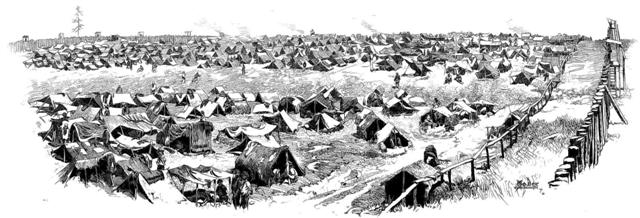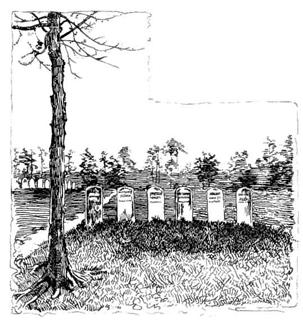
This court was quickly organized. The judge to preside was selected by ballot, and the jury was drawn from a panel of a thousand. The prisoners had the privilege of pleading their own case, or of employing any one within the stockade to plead for them. Two attorneys were selected, from a number of that profession among us, to proceed against the prisoners.
 |
Andersonville Prison Pen, Looking Northeast
from the Southwest Corner.
|
The trial continued six or eight days. It was conducted as fairly and honorably as was possible under the circumstances; and forty or fifty of the two hundred arrested were convicted of crime of some nature, and sentenced to punishment by the "cat-o'-nine-tails," to be "bucked and gagged," to restore property where possible, or otherwise punished, as the nature of the case seemed to require. Six of the number were clearly found guilty of murder in the first degree, and sentenced to be hung within the stockade upon two days' notice. (The murderers were given the privilege of rejecting jurors, and they exercised that privilege till they were tired of it, and allowed a jury to go on.) Wirz furnished the material for a scaffold, and guarded the six unfortunate ones until the appointed day, then delivered them over to us for execution without further assistance on his part.
Of the two hundred men who were thus tried there were probably a few entirely innocent of any crime, while nothing could be absolutely proved against one hundred and twenty of them; yet as their trial ended, and they were set at liberty within the stockade, they were obliged to run the Indian "gauntlet"—a thousand or more emaciated human beings standing ready to administer a blow, a kick, or at least a curse and muttered execration, to those who in a measure had added to our sufferings, even though no act could be proved against them by the court.
Two days later a scaffold was hastily erected near the south gateway, within the stockade. The six condemned prisoners were delivered by Wirz to a posse of our own number, and amidst a breathless silence which pervaded the thirty thousand who watched the ceremony five of the number were quietly swung into eternity. The sixth man, who weighed nearly two hundred pounds, broke his rope and escaped into the crowd, and was only captured after a long chase and after being knocked senseless with one of the executioner's clubs; then he was brought back to the scaffold, and made to join his five companions.

Graves of the Six Raiders Hung July 11, 1864
|
As the prisoners were
brought to the scaffold they acted as though they hardly expected an
execution, but supposed it a farce to frighten them, or that they would be
rescued by their comrades. These executions effectually put a stop to
plunder and murdering. In order to induce twelve men to take the
responsibility of executing these six murderers they were promised by Wirz
to be paroled and sent within the Union lines. This promise I think Wirz
kept, because I never saw them afterwards. A league had been formed by the better class of prisoners, several days before the executions, for the purpose of protecting our lives and scant property; and it was by the aid of this league, headed by a character known as "Big Pete," that these raiders were brought to justice. This league, or "police," as they were called, was ever after kept up, and constituted itself into a complete government for the stockade within the dead-line. "Big Pete," always its chief, exercised absolute authority to punish all offenders against the public peace. After the executions above mentioned, he was judge, jury, chief of police, and often he executed his own sentences. He settled all disputes between individuals, applied the "cat" freely in punishment of petty thieving, bucked and gagged for graver offenses, appointed the night and day patrol within the prison limits from men of his own selection, and was generally a terror to the evil-doer but respected and a blessing to the great mass of prisoners. "Big Pete" had a kind heart, and there was many a poor fellow who could speak of the acts of kindness received at his hands.
|
|
|
visits since 02/21/2004.
Page updated
05/25/2006